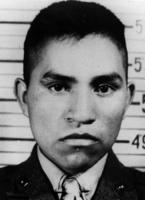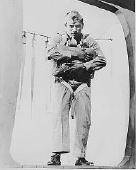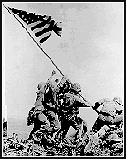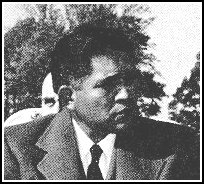 |
| Ira Hayes during his service in the Marines. (www.freebase.com/view/en/ira_hayes) |
Ira Hamilton Hayes was born on January 12, 1923 in Sacaton, Arizona. He was born on the Pima Indian Reservation to a poor farming family. He was the oldest of eight children born to Nancy and Joe Hayes. He was described as a quiet, solemn boy. He and his siblings were raised by their deeply religious mother. She read from the Bible daily and encouraged them to read it by themselves. Until he went into the military Hayes was mostly unnoticed, except for those within a few miles of him.
His mother made sure they had the best education they could get. He attended the local elementary school in Sacaton and had good grades. When he graduated from that school he attended the Phoenix Indian School and continued to have excellent grades. Until he went into the military Hayes was mostly unnoticed, except for those within a few miles of him. Even though he had good grades he left school to join the military.
 |
| Hayes at 19, ready to jump, having just joined th (http://phoenix.about.com/cs/famous/a/irahayes01.htm) |
On August 24, 1942, when Hayes was 19, Hayes enlisted into the Marines. This was unexpected because he was shy and had never been competitive. He had been following the reports on the war closely and after the bombing of Pearl Harbor by the Japanese he felt it was his duty to join and help. After the Tribe approved his choice he was given a proper sendoff and headed for the boot camp. He actually enjoyed the discipline, challenge, and fellowship of the Marine training. He even applied for parachute school and was accepted. He even gained the nickname "Chief Falling Cloud".
 |
| The Raising of the Flag on Iwo Jima. (www.thegoldweb.com/voices/irahayes.htm) |
Iwo Jima is a small Japanese island with a peak that could become a possible supply point. The Allies, the "good" guys, couldn't let the Axis powers, the enemies, use it as such. On February 19, 1945 a group of Marines landed on the island. They faced an equally large army of Japanese defenders. Four days of combat, one of the bloodiest and fiercest combats, left several great fighters dead. On February 23, 1945 40 Marines climbed Mount Suribachi on a mission to plant the U.S. flag at the top. Joe Rosenthal took several photos of the fight, including the raising of the U.S. flag. Rosenthal won the Pulitzer Prize for the photograph of the flag's rising.
 |
| Photo taken 10 weeks before his death. (www.thegoldweb.com/voices/irahayes.htm) |
Six men raised the flag that day; one being Ira Hayes. the other five men were Mike Strank from Pennsylvania, Harlon Block from Texas, Franklin Sousley from Kentucky, John Bradley from Wisconsin, and Rene Gagon from New Hampshire. Strank, Block, and Sousley all died in combat after raising the flag. The battle was costly, of the 250 Marines that landed that day 27 lived; of the 45 in Hayes' platoon only 5 survived. All three the men were chosen by the War Department to be honored as heroes. They even went to Washington D.C. to see President Truman. The National Treasury needed money and started a bond program. The heroes were paraded through 32 cities. Gagon enjoyed these displays, while Hayes and Bradley saw themselves as pawns. After all the public displays ended, the three returned home.
Hayes returned home to the reservation and became very introverted. He seemed guilty that he survived and that so many of his comrades had died. He had never really thought of himself as a hero. President Eisenhower even praised him as a hero. When a reporter asked him, "How do you like the pomp and circumstances?" he responded "I don't". After returning home he worked menial jobs, as he never went to college for a degree. He was known to drown his pain and to seek salvation through alcohol. He was constantly arrested, some say 50 times. This dependency on alcohol would lead to his unfortunate demise.
On January 24th, 1955 Hayes (then 32) was found dead a short distance from his home. He was literally dead drunk. The coroner ruled his death as an accident. He was said to have fallen into an irrigation ditch while drunk and had frozen to death. He died alone in the country he once was called a hero in. He also fell into the single water source for his people granted by the government he once served. He was buried in Arlington National Cemetery. Even though he is gone, there are several memorials that won't let him be forgotten.
There are numerous memorials for the Pima Indian. A song, called The Ballad of Ira Hayes, was written by Peter LaFarge and tells the commonly debated story of Hayes. In 1954, the monument of the raising of the flag in Iwo Jima was revealed. Hayes attended this event; which was in Washington D.C. A speech that was delivered on November 10, 1993 by General Carl Mundy, that was to celebrate the 218th birthday of the Maine Corps, was held at the Iwo Jima monument and words in the speech spoke fondly of him. He was a great hero who met an unfortunate end but is immortalized in the memorials of him. He will always be remembered as a great man and warrior.
Page created on 3/1/2011 12:00:00 AM
Last edited 3/1/2011 12:00:00 AM
